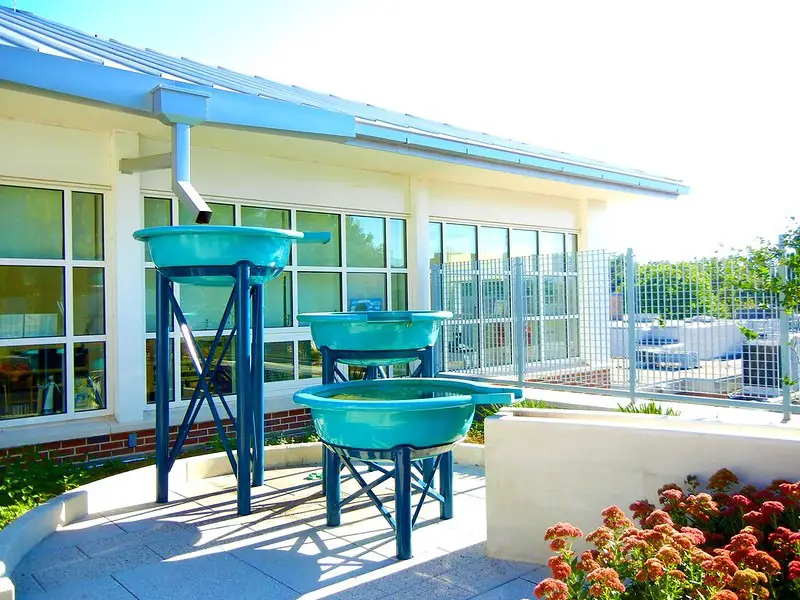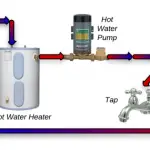If you are someone serious about water conservation, rainwater harvesting or collecting rainwater is something you would find one of the prime means of doing that. Instead of letting the rainwater run off, environmentalists focus on the methods to collect rainwater. But is it illegal to collect rainwater? Let us try finding out.
Rainwater harvesting or collecting rainwater for different purposes. It used to be illegal in some of the states in the United States. However, things have been changing in recent times. Most of the states have made it legal to collect rainwater. Some states, such as Arkansas, California, Colorado, Georgia, Illinois, Nevada, Ohio, Utah, Virginia, Washington, and Wisconsin have imposed restrictions on collecting rainwater.
What is Rainwater Harvesting?
Rainwater harvesting refers to the art of collecting the rainwater instead of letting it run off and getting wasted. The water thus collected is used for several purposes, such as drinking, irrigation, plantations, and other domestic usage.

There are several methods used to collect rainwater. One of the best methods used for collecting rainwater is rooftop harvesting. There are several channels used for collecting the water; typical among them is the gutter system of your home. The complete rainwater harvesting includes a gutter system, a filter, and a cistern.
Are There Restrictions on Collecting Rainwater?
Yes, there are some restrictions imposed on rainwater harvesting in certain states in the United States. The legality and illegality of the harvesting system are largely based on the state laws. Some states encourage the rainwater harvesting and offer incentives for the homes indulging in the practice. Some other states have regulations on it or have entirely prohibited it.
The regulations that govern the rainwater harvesting systems include several legal concepts. Some of them would include:
- Requirements for a permit: Some states do not restrict rainwater harvesting. But you will need to have permits for rainwater harvesting. This may include following a few guidelines and paying fees.
- Water rights: If your state has strict water rights laws, there would be strict rainwater harvesting regulations.
- Quality of water: You will need to focus on maintaining the quality of harvested water. This may include the guidelines with respect to filtration.
- Use restrictions: A few states restrict the use of harvested water for certain specific use cases. A good example is using the collected water for non-potable purposes.
Why is it Illegal to Collect Rainwater?
There are several reasons why rainwater collection is illegal or restricted in some of the states. One of the reasons is that too much rainwater can disrupt the water cycle by restricting the amount of water seeping into the heart. This can affect the water supply by restricting the level of underground water levels.
Some other reasons why states restrict rainwater collection or totally ban it include
- Rainwater is not as pure as you would consider, thus making it unsafe to drink directly.
- Rainwater can have a huge number of contaminants as you collect it. Bird poop is perhaps one such possible contaminant, making it not much safer for domestic use.
- The rainwater belongs to the people nearby as it moves into the ground by providing for the groundwater reserves.
Where Is It Illegal to Collect Rainwater?
Rainwater harvesting is illegal in Arkansas, California, Colorado, Georgia, Illinois, Nevada, Ohio, Utah, Virginia, Washington, and Wisconsin. It may be noticed that it is not completely illegal to harvest rainwater in its entirety in all these states, but you will find restrictions imposed on water harvesting.
The table below should give you an idea of which states permit the collection of rainwater and which states regulate rainwater harvesting:
| State | Restricted? | Incentiviced? | Details |
| Alabama | No | No | Water collection is a private property |
| Alaska | No | No | Rainwater harvesting is the primary means of water collection for most homes |
| Arizona | No | No | |
| Arkansas | Yes | No | Collected water cannot be used for drinking; the system should be installed by a registered plumber |
| California | Yes | No | You can harvest rainwater only for approved purposes |
| Colorado | Yes | No | You can collect a maximum of two barrels of rainwater with a maximum combined capacity of 110 gallons |
| Connecticut | No | Yes | No restrictions, but homeowners are encouraged to do so |
| Delaware | No | Yes | No restrictions, but you have incentives sponsored by the government |
| Florida | No | Yes | Offers incentive and rebate programs |
| Georgia | Yes | No | Tight regulations, Harvested water should only be used for outdoor purposes |
| Hawaii | No | Yes | Highly encouraged by the govt |
| Idaho | Yes | No | You can harvest rainwater as long as it does not get back to the natural resources |
| Illinois | Yes | No | Water must be used for non-potable purposes |
| Indiana | No | Yes | No restrictions, but it is encouraged |
| Iowa | No | No | |
| Kansas | No | No | |
| Kentucky | No | No | |
| Louisiana | Yes | No | Permitted if you follow the guidelines |
| Maine | No | No | |
| Maryland | No | Partially | Some counties offer incentives |
Is It Illegal to Collect Rainwater in Texas?
No, it is not illegal to collect rainwater in Texas. In fact, Texas supports rainwater harvesting through several laws and incentives for collecting water.
Texas is a state that actively encourages collecting rainwater and even incentivizes it. Most of the counties from across the state provide you special incentives for collection rainwater. So much so that Texas also has a special incentive scheme for those looking to collect rainwater – The Texas Rain Catcher Award.
Is It Illegal to Collect Rainwater in California?
Until 2012, California treated rainwater collection as illegal. However, after the passage of the Rainwater Capture Act in 2012, there are no restrictions on collecting rainwater. You can comfortably install a rainwater harvesting system to help you in collect the rainwater.
However, if your rainwater harvesting is used for creating a water supply for the other purposes, such as a swimming pool, spa, or fountain, in such cases, you would need to seek permission from the competent authorities.
The complete list of states and their status with respect to rainwater harvesting
Here is the complete list of states based on which of them restrict or support rainwater harvesting:
- Alabama – No regulations. Water harvesting is a private property right
- Alaska – Unrestricted rainwater harvesting. It is part of your water rights.
- Arizona – Rainwater harvesting is legal.
- Arkansas – Rainwater harvesting is permitted with some restrictions. Harvested water can only be used for non-potable purposes.
- California – It is permitted for the residential, commercial, and governmental landowners may install, maintain, and operate rainwater capture systems, but only for the specific purposes.
- Colorado – You may collect two main barrels with a combined capacity of 110 gallons
- Connecticut – No restrictions, incentives available
- Delaware – No restrictions on water harvesting. But incentives are available.
- Florida – No rainwater harvesting restrictions. Instead, it is highly encouraged.
- Georgia – You can use rainwater harvesting only for outdoor purposes. It is monitored by the Department of Natural Resources
- Hawaii – No restrictions or rainwater harvesting laws on rainwater harvesting.
- Idaho – Not many restrictions. But rainwater should not enter natural waterways.
- Illinois – Rainwater harvesting is highly restricted. The water should be used only for non-potable purposes.
- Indiana – Rainwater harvesting is not restricted and is highly encouraged.
- Iowa- No restrictions on the collection of rainwater
- Kansas – Rainwater harvesting is permitted, and no restrictions, as long as it is used for domestic purposes.
- Kentucky – No rainwater harvesting restrictions
- Louisiana- It is entirely legal to collect rainwater. But you need to use large cisterns
- Maine – No restrictions on rainwater collection
- Maryland – No rainwater harvesting restrictions. Some counties even offer incentive
- Massachusetts – Rainwater harvesting is encouraged and completely legal
- Michigan – Rainwater harvesting is encouraged and completely legal
- Minnesota – Rainwater harvesting is encouraged and completely legal
- Mississippi – Rainwater harvesting is entirely legal
- Missouri – Rainwater harvesting is encouraged and completely legal
- Montana – Rainwater harvesting is encouraged and completely legal
- Nebraska – Rainwater harvesting is legal and is promoted by the universities in the state
- Nevada – Rainwater harvesting is permitted as part of the water rights. There are regulations on rainwater harvesting. Must be used only for intended purposes.
- New Hampshire – Rainwater harvesting is entirely legal
- New Jersey – Rainwater harvesting is legal.
- New Mexico – Rainwater harvesting is permitted and encouraged
- New York – Rainwater collection is permitted, legal, and taught
- North Carolina – Completely legal to harvest rainwater
- North Dakota – Rainwater harvesting is legal and encouraged through incentives
- Ohio – Rainwater harvesting is legal for both potable and non-potable water purposes
- Oklahoma – Rainwater collection is completely legal
- Oregon – Rainwater harvesting is legal, but water should be collected using specific systems
- Pennsylvania – It is legal and encouraged to harvest rainwater
- Rhode Island – Rainwater harvesting is legal. Citizens get incentives for harvesting rainwater
- South Carolina – Rainwater harvesting is legal.
- South Dakota – It is legal to collect rainwater
- Tennessee- Rainwater harvesting is legal
- Texas – Rainwater harvesting is legal with some restrictions
- Utah – Rainwater harvesting is permitted in regions owned and leased by the person who collects the water
- Vermont – Rainwater harvesting is legal. Citizens are allowed to collect rainwater.
- Virginia – Rainwater collection is incentivized through income tax incentives and benefits.
- Washington – Rainwater harvesting is completely legal
- West Virginia – Rainwater harvesting is legal
- Wisconsin – Rainwater harvesting is legal
- Wyoming – Rainwater harvesting is legal.
Conclusion
In the past, several states in the United States restricted rainwater harvesting. However, in recent times, most of the states have decided to lift the restrictions on the use of rainwater harvesting. With states such as Texas, North Carolina, and New Mexico offering incentives for rainwater harvesting, it is evident that more states will begin following suit.











Add Comment